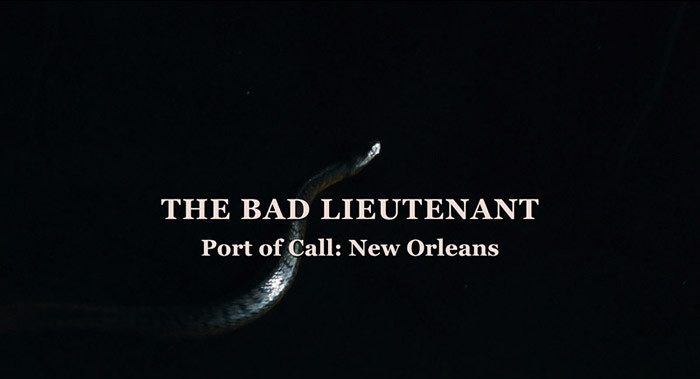
I liked this when I saw it last year in theaters, even more than I thought I was going to. Nicolas Cage gives not just a typically batshit performance; he gives a surprisingly nuanced batshit performance. He gives us a character that actually evolves and develops throughout the story, and it's fascinating to watch.
The script is fun as hell, too. I admit to not yet having seen Abel Ferrara's original (edit: Now I have), but I know this isn't a remake at all. It feels -- and this is clearly wild speculation -- more like riffing on a theme than any kind of homage or remake. And to that end, this story about a "bad cop" who keeps pushing further is great. There's so much tension in watching someone pulled tighter and tighter and waiting for everything to snap, explode, collapse.
But the story here is smart. The moral world of Port of Call is complex and unnavigable. Even the good cops play loose and dirty with the law. The authority doesn't really get involved, and the worst punishment seems to involve being kicked out of the game -- and even that is shockingly temporary. The deeper into depravity Terrence McDonagh goes, the more he drags along those loved ones foolish enough to tether to him. Eventually he pushes well past the limits we even expect him to, until he seems to break miraculously though some kind of membrane and come out not just clean, but having yanked his entire world inside out with him. The bad guys get caught and/or killed, his loved ones have become a (clean?) "family," and he himself has been promoted from Bad Lieutenant to Captain.
At the end, we have two perfect codas: first, we see Terrence back on the prowl for preppie kids with easily snatched drugs and girlfriends, proving he hasn't changed his ways at all, and the cycle will continue itself; second, we see Terrence lost in a drug-haze in a hotel room, encountering Chavez, the felon whose life he saved in the prologue. It was the act of saving this man's life that transformed him -- it permanently damaged his spine and put him on pain pills (making him Bad) but also won him a promotion and the reputation of a hero (making him a Lieutenant). So this encounter at the end is a major moment -- will (or even can) Terrence be saved by the man he wrecked his own already-questionable life saving? The answer at the end is as obtuse and enervating as the iguana shots during the stake-out: it's Terrence and Chavez, sitting together against an aquarium wall. Chavez looks spaced-out, possibly bored. Terrence looks like... is he about to laugh? What is going on in his mind? Then -- "Ha!" -- a single half-chuckle, like he's about to tell you what's so funny, and then that cut to black. That's all you get.
It's morally ambiguous, but more aggressively so than films usually get, and madman poet Werner Herzog is a perfect match for the material. A lot of elements that feel like they wouldn't work really work. It's a strange movie -- what Herzog film isn't? -- and I'm glad it exists.

No comments:
Post a Comment